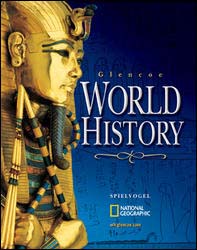Glencoe World HistoryChapter 1:
The First Humans, Prehistory–3500 B.C.Web Activity Lesson PlansIntroduction
Louis B. Leakey once said, "Theories on prehistory and early man constantly
change as new evidence comes to light." Discoveries by Leakey and his wife,
Mary, resulted in some of the most important changes in our understanding
of early human development. Some new ideas are so dramatic that they force us
to adjust our view of the world. When this happens we say that a paradigm shift
has occurred. In this activity students will read about discoveries by the Leakey
family that continue to cause paradigm shifts. Lesson Description
Students will go to the Leakey Foundation Web site to read a news item about
a discovery in the field of archaeology relating to an early species of hominid.
They will answer four questions about what they have read and then write a summary
on a class discussion of the topic. Instructional Objectives - Students will be able to discuss the impact of new
discoveries on current archaeological theories.
- Students will be able to demonstrate their understanding
of archaeological research by holding a classroom discussion and writing a
summary paper.
Student Web Activity Answers - Meave Leakey discovered fossils belonging to a new genus of human ancestor,
Kenyanthropus platyops.
- "Lucy" is the name of a partial skeleton discovered in Ethiopia
in 1974 that is of approximately the same age as Leakey's Kenya fossil find.
- "Lucy" supported a growing belief among scientists in the 1980s
that there was a single common human ancestor that gave rise to successive
species during the past 3 million years.
- Meave Leakey says the new species shows that at least two lineages of humans
existed as far back as 3.5 million years. This discovery could cause archaeologists
to reject the view, which prevailed until recently, that humans evolved from
a common ancestor and to adopt the notion that various lines of human evolution
occurred simultaneously.
- Students' contributions to the discussion and their papers will vary, but
students should note different viewpoints and make suggestions about further
research.
 | 






